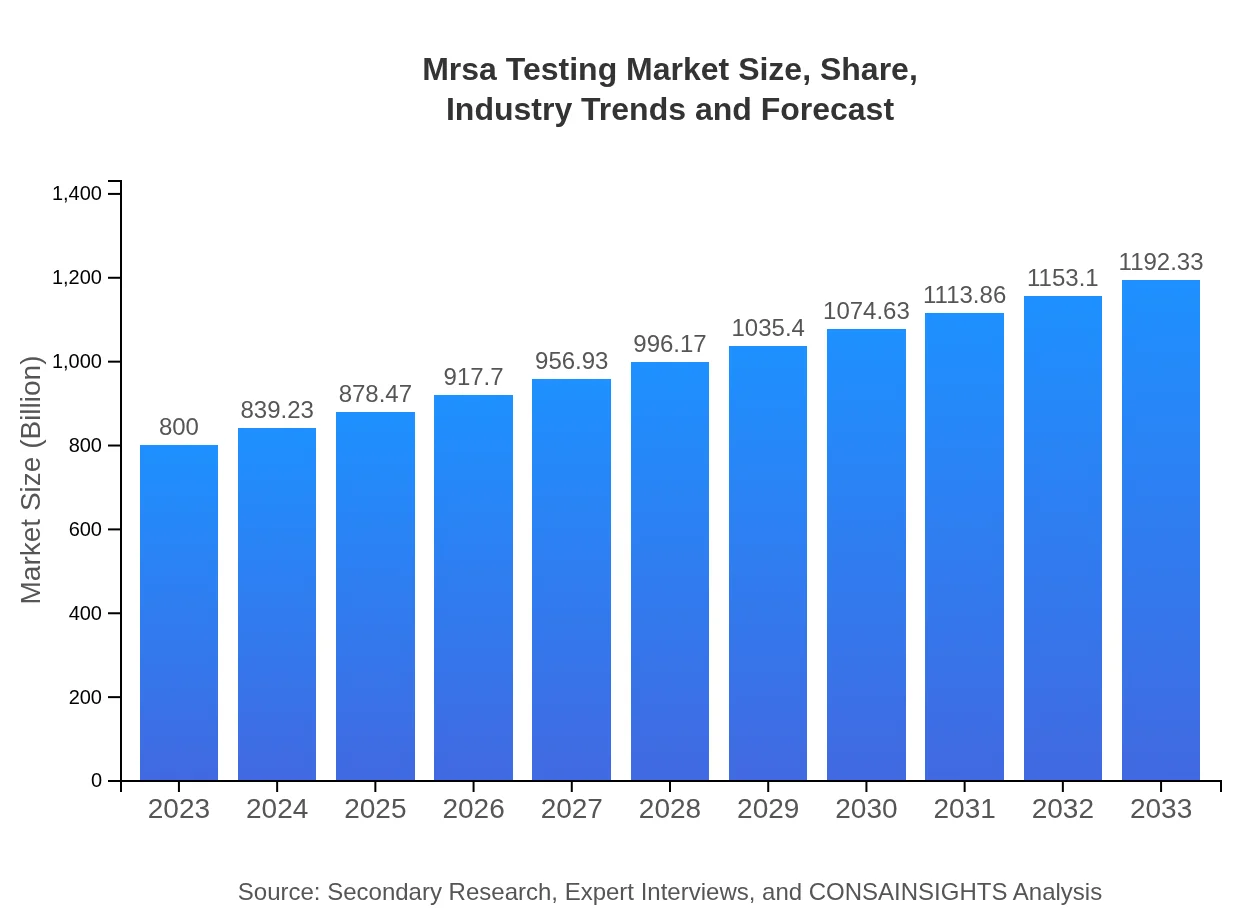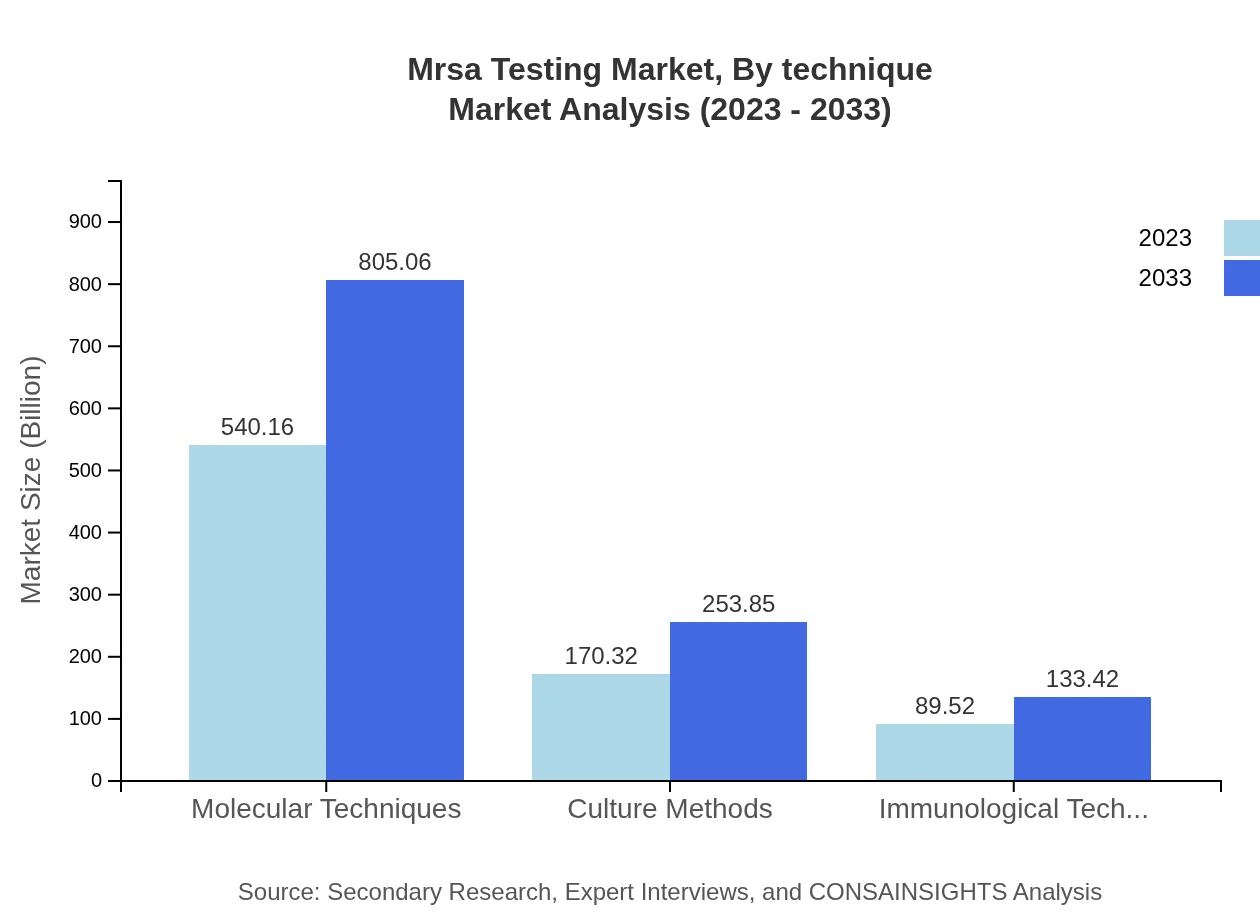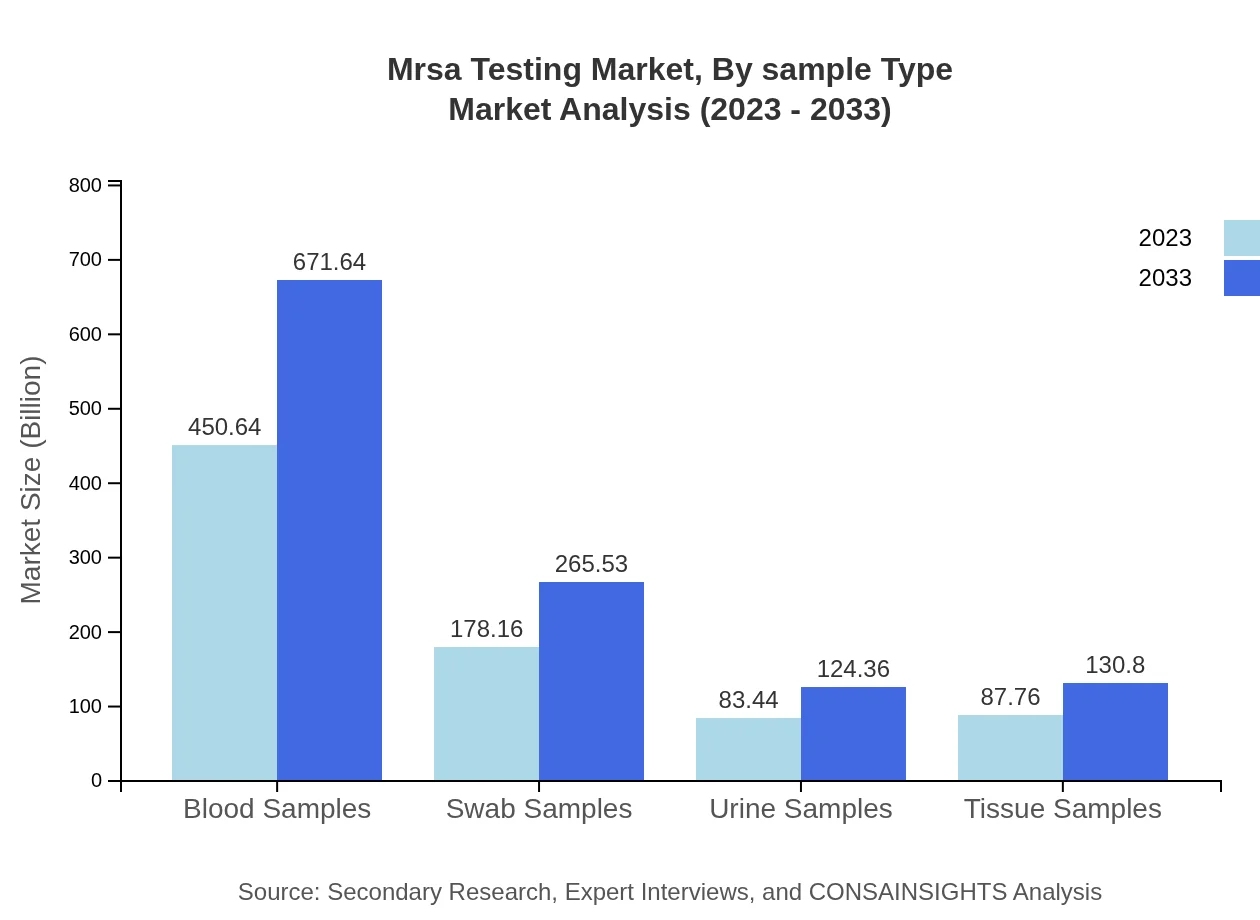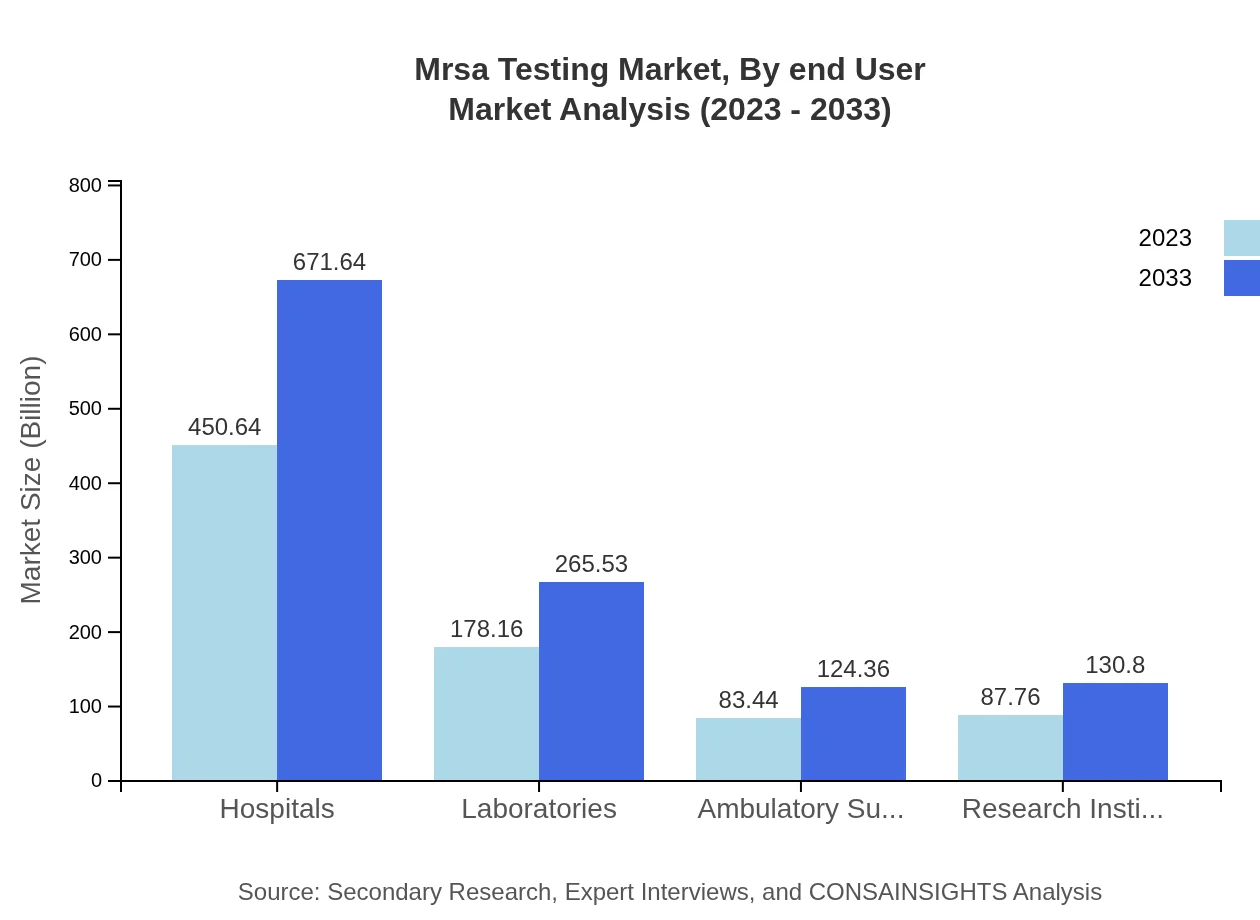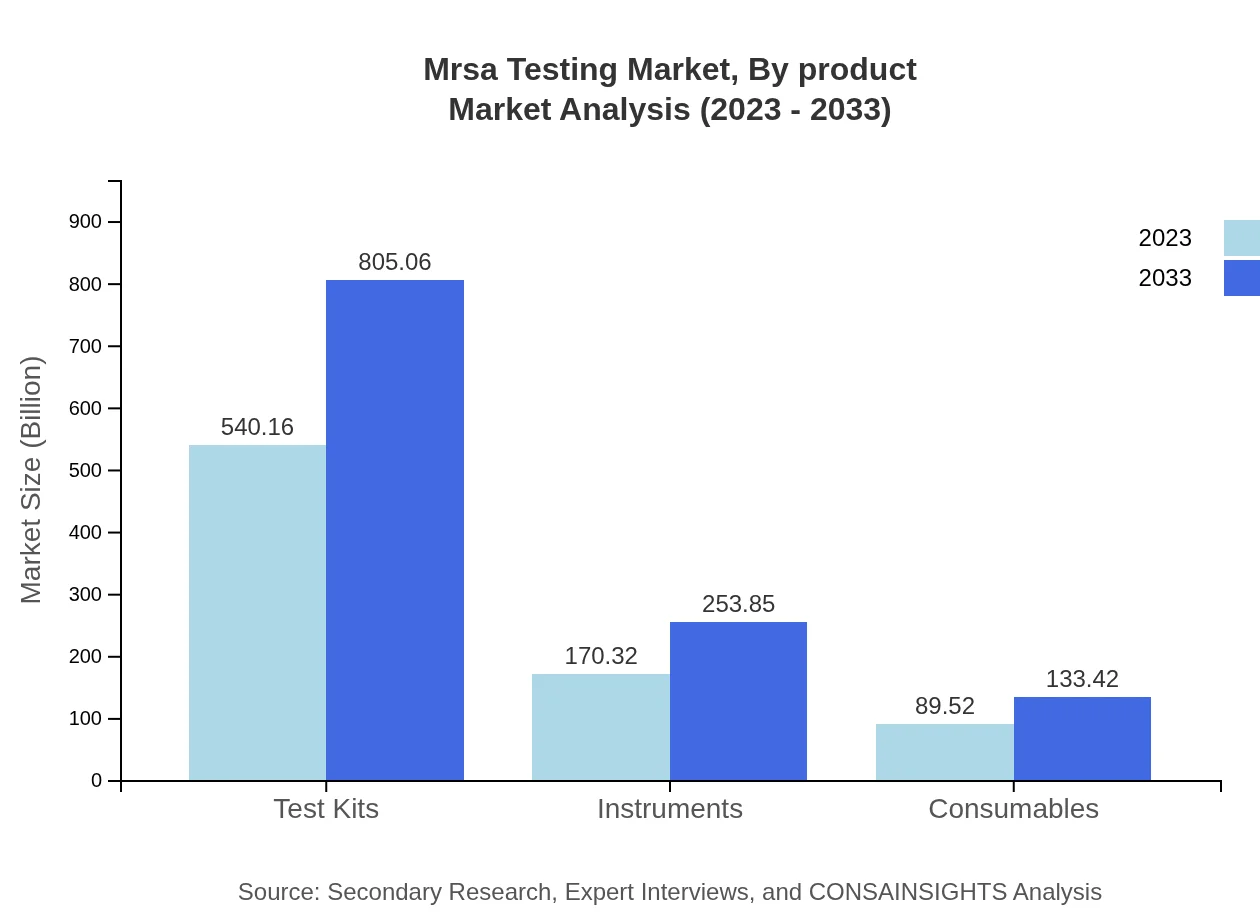Mrsa Testing Market Report
Published Date: 31 January 2026 | Report Code: mrsa-testing
Mrsa Testing Market Size, Share, Industry Trends and Forecast to 2033
This report delves into the MRSA testing market covering market trends, industry analysis, segmentation, and current statistics to provide insights from 2023 to 2033.
| Metric | Value |
|---|---|
| Study Period | 2023 - 2033 |
| 2023 Market Size | $800.00 Million |
| CAGR (2023-2033) | 4.0% |
| 2033 Market Size | $1192.33 Million |
| Top Companies | Roche Diagnostics, Thermo Fisher Scientific, BD (Becton, Dickinson and Company), Cepheid |
| Last Modified Date | 31 January 2026 |
MRSA Testing Market Overview
Customize Mrsa Testing Market Report market research report
- ✔ Get in-depth analysis of Mrsa Testing market size, growth, and forecasts.
- ✔ Understand Mrsa Testing's regional dynamics and industry-specific trends.
- ✔ Identify potential applications, end-user demand, and growth segments in Mrsa Testing
What is the Market Size & CAGR of MRSA Testing market in 2023 and 2033?
MRSA Testing Industry Analysis
MRSA Testing Market Segmentation and Scope
Tell us your focus area and get a customized research report.
MRSA Testing Market Analysis Report by Region
Europe Mrsa Testing Market Report:
In Europe, the MRSA testing market is expected to evolve from USD 229 million in 2023 to approximately USD 341 million by 2033. Stringent regulations for infection control and a heightened focus on antibiotic resistance are propelling the growth of testing solutions.Asia Pacific Mrsa Testing Market Report:
In Asia Pacific, the MRSA testing market is projected to grow from USD 164 million in 2023 to USD 244 million in 2033, reflecting a demand for enhanced infection control measures amid growing healthcare infrastructure developments. Countries like China and India are increasingly investing in epidemic management, driving the need for effective MRSA testing solutions.North America Mrsa Testing Market Report:
North America is anticipated to lead the MRSA testing market, expanding from USD 277 million in 2023 to USD 414 million by 2033. The presence of key market players coupled with advanced healthcare facilities and a high prevalence of HAIs contribute significantly to market growth.South America Mrsa Testing Market Report:
The South American market for MRSA testing is expected to grow from USD 74 million in 2023 to USD 110 million by 2033. This region is witnessing improvements in healthcare access and technology, with governments focusing on tackling infectious diseases, including MRSA.Middle East & Africa Mrsa Testing Market Report:
The Middle East and Africa region is set to experience growth from USD 55 million in 2023 to USD 82 million by 2033 as countries enhance their healthcare frameworks. Efforts to control the spread of MRSA through improved diagnostic testing are vital in this region.Tell us your focus area and get a customized research report.
Mrsa Testing Market Analysis By Technique
The market analysis by technique indicates that molecular techniques dominate the MRSA testing market, growing from USD 540 million in 2023 to USD 805 million by 2033, representing a significant share of 67.52%. Culture methods follow, expected to increase from USD 170 million to USD 254 million, with a share of 21.29%. Immunological techniques also play a role, with a market size projected to rise from USD 89 million to USD 133 million.
Mrsa Testing Market Analysis By Sample Type
For sample types, blood samples lead with a size of USD 450 million in 2023, growing to USD 672 million by 2033, capturing a 56.33% market share. Swab samples and urine samples follow, with projected sizes of USD 178 million to USD 266 million and USD 83 million to USD 124 million, respectively.
Mrsa Testing Market Analysis By End User
Hospitals represent the largest end-user segment for MRSA testing, with a market size growing from USD 450 million in 2023 to USD 672 million by 2033, maintaining a 56.33% share. Laboratories are another key segment, expected to see growth from USD 178 million to USD 266 million, showing the demand for testing solutions in varied healthcare settings.
Mrsa Testing Market Analysis By Region
Global MRSA Testing Market, By Region Market Analysis (2023 - 2033)
Geographically, the North American region leads, followed by Europe and the Asia Pacific, each with specific factors driving market growth. North America benefits from advanced healthcare access, while Europe emphasizes regulatory compliance and Asia focuses on infrastructure development.
Mrsa Testing Market Analysis By Product
In terms of products, test kits show strong performance, from USD 540 million in 2023 to USD 805 million in 2033, capturing 67.52% share. Instruments follow with revenue growing from USD 170 million to USD 254 million, emphasizing the shift towards technological integration in testing.
MRSA Testing Market Trends and Future Forecast
Tell us your focus area and get a customized research report.
Global Market Leaders and Top Companies in MRSA Testing Industry
Roche Diagnostics:
A leader in diagnostic testing, Roche specializes in developing innovative testing solutions, particularly in molecular diagnostics for infectious diseases like MRSA.Thermo Fisher Scientific:
Known for its comprehensive range of laboratory equipment and reagents, Thermo Fisher plays a key role in the MRSA testing market through its cutting-edge testing technologies.BD (Becton, Dickinson and Company):
A key player in medical technologies, BD is engaged in producing testing kits that are crucial for the detection of MRSA strains, enhancing patient safety.Cepheid:
Specializes in molecular diagnostics, Cepheid is known for its GeneXpert platform, which rapidly identifies MRSA infections, significantly impacting turnaround times in clinical settings.We're grateful to work with incredible clients.









FAQs
What is the market size of MRSA Testing?
The MRSA Testing market is valued at approximately $800 million in 2023. It is projected to grow at a CAGR of 4.0%, reaching a market size of around $1.18 billion by 2033.
What are the key market players or companies in the MRSA Testing industry?
Key players in the MRSA Testing market include Abbott Laboratories, Cepheid, bioMérieux, Thermo Fisher Scientific, and Roche Diagnostics. These companies lead through innovation, product offerings, and strategic partnerships to capture market share.
What are the primary factors driving the growth in the MRSA Testing industry?
Growth in the MRSA Testing market is driven by increased awareness of healthcare-associated infections, technological advancements in diagnostic testing, rising healthcare expenditures, and government initiatives for infection control, fostering demand for efficient testing solutions.
Which region is the fastest Growing in the MRSA Testing market?
The fastest-growing region in the MRSA Testing market is North America, projected to grow from $277.76 million in 2023 to $413.98 million by 2033, driven by high healthcare standards and advanced diagnostic capabilities.
Does ConsaInsights provide customized market report data for the MRSA Testing industry?
Yes, ConsaInsights offers customized market report data for the MRSA Testing industry, tailoring insights based on specific client needs, including detailed analysis, segmentation, and regional forecasts tailored to client specifications.
What deliverables can I expect from this MRSA Testing market research project?
Deliverables from the MRSA Testing market research project include a comprehensive report, market size data, growth forecasts, competitive analysis, segment performance, and insights into market trends and regional dynamics.
What are the market trends of MRSA Testing?
Current trends in the MRSA Testing market include increased adoption of molecular diagnostics, integration of automated testing systems, advancement in rapid testing technologies, and a focus on point-of-care testing to improve patient outcomes.

